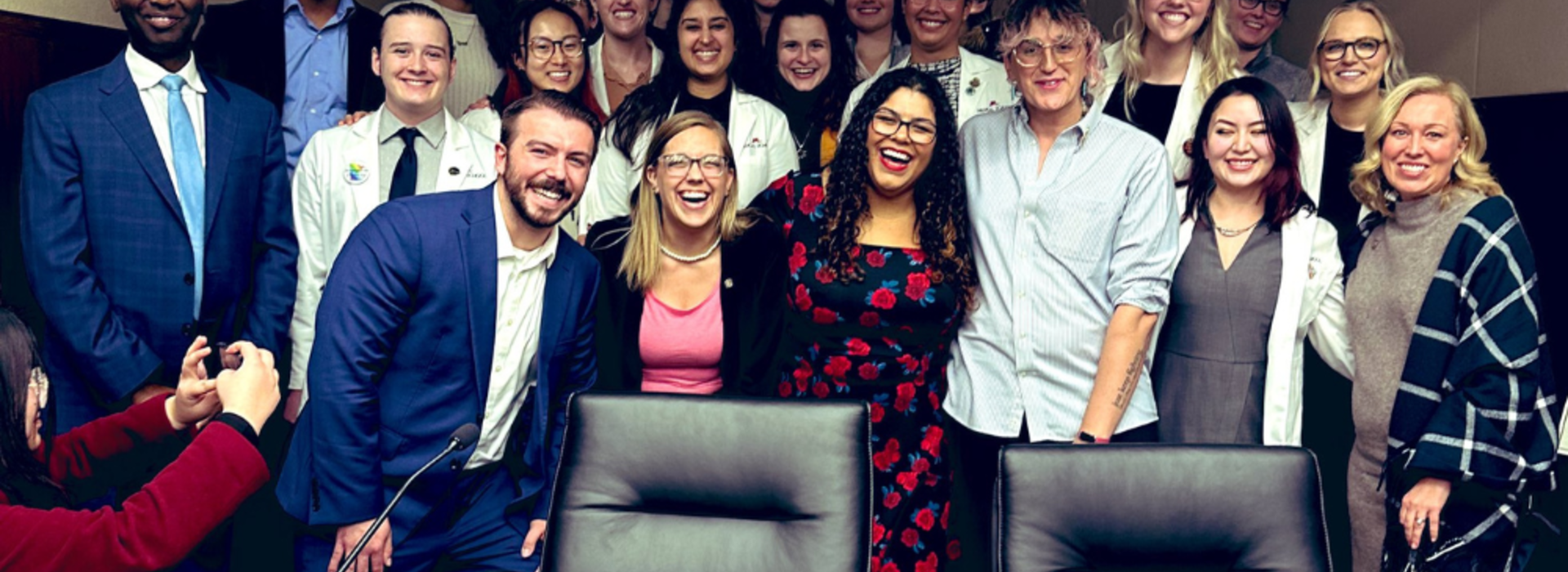
University of Minnesota Medical Students Testify Before Minnesota Legislature in Support of Bill Banning Conversion Therapy
University of Minnesota Medical Students Testify Before Minnesota Legislature in Support of Bill Banning Conversion Therapy
Five U of M medical students testified before the House Human Services Policy Committee in support of a bill that would prohibit conversion therapy for children and vulnerable adults in Minnesota.
On January 18, the Minnesota House Human Services Policy Committee voted to move forward HF16, a bill written by Rep. Athena Hollins that would ban conversion therapy (the practice of attempting to change an individual's sexual orientation, gender identity or gender expression) for children and vulnerable adults. Among those testifying in support of the bill were University of Minnesota medical students Macie Darden, Katie Jeddeloh, Senait Judge-Yoakam, Sydney Lo and Austen Ott. The students say that the experience has shaped the way they think about their roles as future physicians.
“I’m going to take this with me going forward,” says Ott, “knowing that, as a future physician, I am in a position of privilege, and I should use that voice to advocate for my patients.”
Jeddeloh agrees, “LGBTQ advocacy is important to me, and being able to do it alongside my peers was really exciting. This provided an opportunity to think about what it means to be a physician and member of the LGBTQ community. I didn’t know how prevalent conversion therapy was in Minnesota, so that kicked me into gear to do whatever I can to help this bill pass.”
In Minnesota, there are currently 28 organizations that support or use conversion therapy, along with 86 therapists who conduct it. Of those 86, 34 are licensed.
“Patients subjected to conversion therapy are twice as likely to attempt suicide and two and half times more likely to have multiple suicide attempts within a year following conversion therapy,” states Lo. “There’s risk of self-hatred, anxiety, depression, self-harm.”
“There is no collective body or organization that has any supporting evidence or research that conversion therapy works or has any benefit,” Darden states.
The students chose to take a stand to advocate for their community and future patients, and the experience was powerful.
“It felt very empowering as a trans person to be able to speak to the effects of conversion and work together with the legislators who are in support of this bill, one of whom is Rep. Leigh Finke, who is a trans woman herself,” Ott says.
“It was so empowering,” agrees Lo. “I’m an MS2, so I have yet to work with patients in an extensive way. This was my first time fighting for public good and public health and representing the field of medicine.”
However, the experience came with frustration and reminders of work still to be done.
“We were there to discuss a bill that would protect children and vulnerable adults, and the people opposing the bill constantly tried to change the topic,” explains Darden. “I left feeling shocked by the amount of misinformation that takes time away from what is true and what is evidence-based.”
Jeddeloh adds, “I was on the verge of tears a few times from testimony from my peers but also frustration.”
From here, the bill will move to other House committees and, if successful, the Senate before it becomes law. The students plan to stay engaged and encourage others to get involved, as well.
“It’s as easy as watching online to see what bills are going through committees,” explains Ott. “You can email the clerk of the committee to get your name on to testify.”
All of the students feel that advocacy will be an important part of their future careers.
“That’s part of our oath,” says Lo, “to do no harm and try to do the best for everyone.”